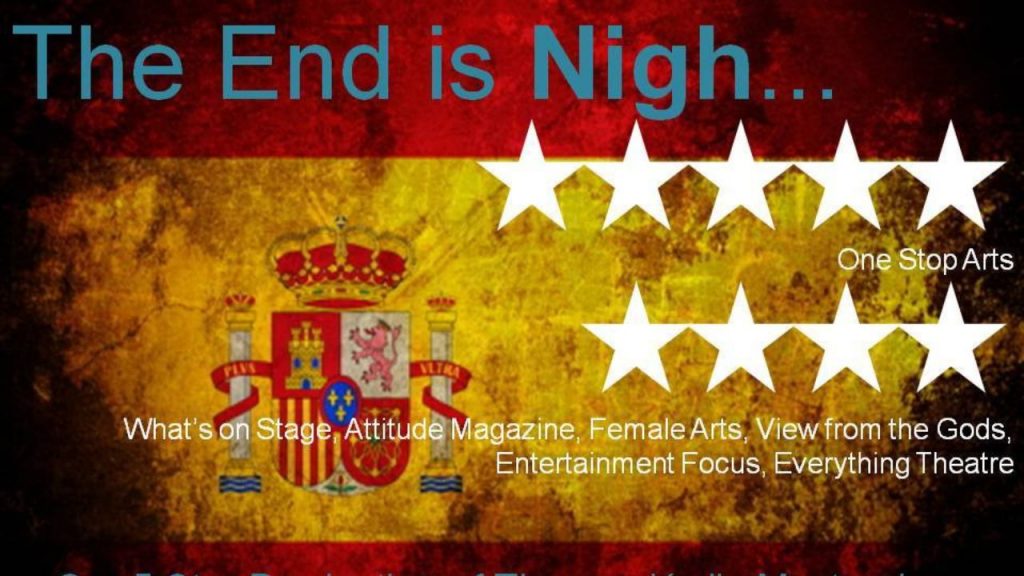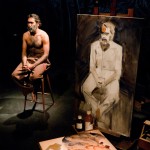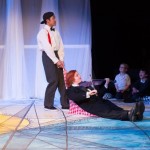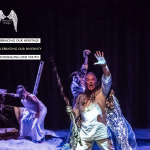An Appetite For Revenge: The Spanish Tragedy at the Blue Elephant
Lazarus Theatre productions never fail to grab you from the moment you enter the theatre. You step through into a world of mayhem as if stepping through an invisible membrane that divides you from where you’ve come. At the Blue Elephant Theatre.
Thomas Kyd’s The Spanish Tragedy is the fifth production I’ve seen by Lazarus Theatre since seeing Don Carlos at the Blue Elephant in 2011. Now, as I come to anticipate coming to see another Lazarus production directed by Ricky Dukes, I find myself thinking: “Surely he is NOT going to use the smoke machine again?”
I also find myself wondering about Dukes’ strategic choice of working with only one style and form of theatre, albeit historically significant to English and European cultural identity. Then I come and view the show and once again I’m blown away by Dukes’ inventiveness, which in no small way includes assembling a cast and crew of creative people that work together like a magnificent orchestra, tensely tuned and stunningly dynamic.
So far, Lazarus Theatre productions have never failed to grab me from the moment I enter the theatre. I feel I step through into a world of dramatically interpreting Elizabethan and Jacobean mayhem as if stepping through an invisible membrane that divides me from where I’ve come.
This happens again for me as I move to my seat for The Spanish Tragedy and find actors “warming-up” on stage with a playful name game, revealing the names of the fifteen cast members. I note the piles of books strategically placed to signal the thinking as well as the acting work for the production. I also note how the design of calico drapes and red, white and blue bunting carry me further into of an imaginary Spain and Portugal, rather than any real geographical place.
I shift my gaze as the lighting reduces space through the use of a single spotlight directing me around the black box theatre. I hear the clarity of the actors’ voices as they speak Thomas Kyd’s lines, bringing meaning to each phrase, word and pause. And that’s only the first ten minutes into the production!!
Yet at a rational level, I know that this rather cumbersome play shouldn’t work. It should be dead and buried, along with its raw desire for bloody revenge dressed up in the poetic language of Elizabethan drama. But once again, I see how Dukes turns a seeming dramaturgical weakness into strength in a performance that shapes the dramatic action poignantly and melodramatically. I find myself viewing the actions, simultaneously knowing they are preposterous and criminally tragic.
The size of the cast carries the energy to fever pitch, showing how killing gives rise to more killings: Andrea’s ghost and Revenge (Joseph Emms and Maria Alexe) are the play’s master and mistress of ceremony for the act of revenge itself. Yet, as MCs, even they don’t seem to be able to predict the plots and counter-plots of vengeance. I find it an interesting choice that Revenge is a woman, referring back perhaps to the furies of Greek tragedies. The fact, however, that she is dressed in black, rather than, say, the red of Aeschylus’ furies, fits more aptly with Maria Alexe’s presentation of a colder and more strategically aware form of revenge.
What begins with the Spanish Andrea seeking vengeance for his own death at the hands of the Portuguese Balthazar in battle, however, in no time turns into the murder of Horatio in a courtly plot devised by the Spaniard Lorenzo and Portuguese Balthazar. This in turn spurs Hieronimo’s avenging of his son’s, Horatio, death. Throughout it all, Dukes’ direction makes it startlingly clear how ineptly vengeance works as an instrument of justice. By the end of the play, the audience is no clearer than at the start whether justice has been done for Andrea’s ghost by Revenge, or, whether it is Hieronimo’s arrangement of the play-within-a-play for the Spanish court which, in setting up Bel-Imperia’s deathly blow, is the real cause of Balthazar’s demise. As I’m viewing the blood bath, I remember, too, why academics have argued that the play inspired Shakespeare’s Hamlet.
All acting performances are strong and impressive, beginning in the play’s opening with Rosanna Morris portrayal of the King of Spain as the picture of pomposity at the centre of a morally suspect court, which seems out of its depth in international affairs. Spain might have won the war at the start of the action, but the audience sees it lose the peace as courtiers willfully brandish their ambitions pursuing the court’s top prize, marriage to Bel-Imperia. The courtiers Lorenzo and Balthazar, played by James Peter-Bennet and Jamie Spindlove, give solid portrayals of the awful willpower required to win at all cost. I view how the direction also makes very clear that it is love and death that couple in this court in alliances made on bad information of who did what to whom.
But more than anything, I am carried away by Danny Soloman’s Hieronimo, a portrayal of a father driven mad with grief. Soloman makes plausible the terror Hieronimo enacts on the court. I’m particularly impressed by the timing with which he shows the character’s abandonment of reason, beginning with his unwillingness to act then growing into to his role as a Master of Ceremony who brings death and mayhem through the play-within-a-play.
However, its hard to imagine how any of the actors’ strong performances or the designers’ symbolic use of props, costumes and lighting could be realized without Ricky Dukes’ understanding of the dramaturgical significance which The Spanish Tragedy might still hold for us today. Ultimately, I applaud how another Lazarus Theatre production resurrects past meanings of a play about how vengeful actions continue to live today. As I walk towards the exit I speculate with myself how the play might be renamed “The Tragedy of the Middle East” or “The Syrian Tragedy” or, even, by the name of some gangland tragedy in which spilling blood is mistaken for Justice.
Only great directors provoke us into such understandings. I believe Ricky Dukes to be one such director.
Date reviewed: Thursday 26th September 2013






